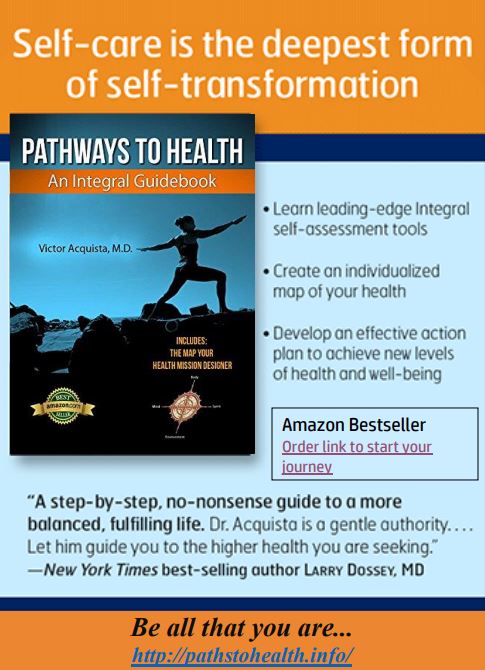Lectures/Workshops/Retreats/Seminars
Dr. Acquista is available for keynote, small group, and large group presentations including retreats. The following presentations are available; he may also present on other topics upon request.
The Life Skills Learning Series—Journey to Self-Transformation are talks which expand on material covered in the book, Pathways to Health. The talks are designed to lead participants down a path of self- transformation. We shall examine the event-response chain as a way to understand various points of individual and collective reaction/reactivity that shape our reality. The choice points along the event –response chain represent decision points at which healthy or unhealthy choices can be made. We draw from Integral Theory to build an Integrally informed model to understand these specific health topics and show how they can be used in stage development and evolution of consciousness.
- Learning to Forgive I – Forgiveness has many demonstrated health benefits including reductions in chronic pain, depression, and anger as well as an increase in optimism, compassion, and self-confidence.
Life circumstances which result in hurt, grievance, or transgression represent events. Suffering accompanies the pain which these events are associated with. Forgiveness offers an alternative response to dealing with these life events and serves to break the chain of attached suffering. - Learning to Forgive II – Here we further explore the event/response chain focusing on the beliefs and values which form the basis of our underlying positions and judgments. These lead to failures in forgiveness. We also explore the roles of cognition, emotion, and volition in shaping our responses. We shall consider ways in which we can use cognition, emotion, and volition to reprogram our responses and thereby develop better strategies to deal with painful life events.
- Grief – We naturally respond to loss with grief. Since our lives are constantly changing we must learn to effectively deal with loss. Acceptance of disease in our own lives frequently results in a loss of self-esteem. It can change how we view ourselves. Grief is part of that response. We examine typical components of a grief reaction. We will consider the loss (event) and our reaction (response) along with the attached suffering. We will use the same conceptual framework presented in Forgiveness I and II to understand the event response chain as it applies to grief. Participants learn about “good” grief as a healthy choice in dealing with loss.
- Motivation – Success in achieving better health is frequently determined by motivation. In this workshop we examine the role of internal and external reinforcers. We also outline how they can be utilized to accomplish beneficial behavioral change. Here we offer insights into cognition, emotion, and volition, identifying and conquering obstacles to motivation, and we explore the inability to maintain motivation. Effective new strategies for success are developed applying the same principles of event-response choice and decision making.
- Stress Management – Stress occurs in relation to internal and external stressors. Frequently these derive from issues of work, relationships, finances, or time management. Whether internal or external or both, these all represent “events” that we react or respond to. In this workshop, we explore the “fight or flight” response and understand the concept of “Allostatic Load” (this represents the cumulative effects of how the body copes with stress.) Building upon the event-response chain model, together we shall develop mental, physical, emotional and spiritual strategies to enable participants to effectively manage stress and enjoy better health.
- Destructive Emotions – Here we study the neurophysiology of fear and anger as states of activation. These states can shape the context in which our life events (content) unfold. The frequency, intensity, and persistence of these response patterns and how these contribute to Allostatic Load are examined. As alternatives, strategies which build on the techniques introduced in the forgiveness, motivation, grief and stress management workshops are offered. Compassion as an alternative to anger, and trust, as an alternative to fear, offer the potential to reprogram unhealthy response patterns and establish a healthier context.
- Attitudes/Perspectives – Here we more fully explore context and content and how these relate to the event-response chain. How do we develop attitudes of optimism and gratitude? How do we learn to cultivate positive emotions such as joy, exuberance, and resilience in our daily lives? Discussion here focuses on spiritual and psychological perspectives, as well as the roles of intention and affirmation.
- Journey to Self-Transformation – In this final workshop we summarize how understanding and applying the principles underlying the event-response chain and content/context of our lives provide a pathway to expansion of consciousness and appreciating life from a different level of perceptual awareness, a perspective which is not egoic and is much more spiritually centered. A method to align with this center and live more authentically is presented. Participants are presented with the principles of an Integral Life Practice.
- Four Quadrant Diagnosis—An overview of Integral Theory and its application to medical practice. This is a general introduction to using Integral Theory to improve assessment and care.
Note: The following presentations are no longer available:
- Leadership and Management for Healthcare Professionals
- Issues and Options in Senior Care
For inquiries about booking Dr. Acquista, please email: [email protected]

